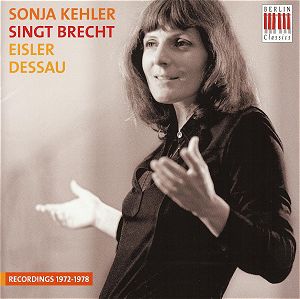
Bertold Brecht and Kurt Weill are for many, I suppose, the inseparable radar couple in German music theatre. In fact their collaboration was short-lived. On the other hand, Dessau and especially Eisler worked with Brecht for many years. Eisler chalked up nearly thirty years collaboration with Brecht. There is, no doubt, a kinship between the three composers: in the straightforward approach, a kind of aggression, the rhythmic patterns, the often blunt ends, the adaptation of elements from jazz and popular music. But whereas Weill has a melodic directness that he was to hone and develop when he moved to the USA to fit into mainstream popular songs and Broadway musical theatre, both Eisler and Dessau are bolder, more experimental, drawing on sometimes harsh harmonies and melodic material based on speech. In particular Paul Dessau was quite avant-garde. The differences can generally be heard both in the theatre songs and the Lieder, where Eisler is sometimes ingratiatingly catchy, Dessau is more evasive. What they have in common is the gift to let Brecht’s lyrics speak – the melodies are not ends in themselves. They fit Brecht’s aesthetics: the epic theatre, the Verfremdungseffekt. This doesn’t imply that there is any kind of monotony. Within the concept there is variation aplenty. Among my personal favourites I would single out the melodically inventive songs from Herr Puntila … (Eisler) and Dessau’s Lied der Mutter Courage, where we hear soldiers marching relentlessly.
The Lieder, many of them quite short, are charmingly jazzy (tr. 17), catchy Schlager-melodies (tr. 18) or intimate ballads (tr. 24). Not all of them are Brecht settings. Dessau’s Tierverse are amusing miniatures and each of them starts like a fairy-tale: Es war einmal … One of them, Das Pferd (The Horse), was composed specifically for Sonja Kehler.
The accompaniments are varied, spanning from simple guitar-chords to full ensemble with winds and percussion, often with witty or illustrative instrumental solos. The arrangements are by Manfred Grabs and Helge Jung. The sound quality is excellent with wide stereo spread. The booklet has an interview with Sonja Kehler but unfortunately no sung texts. The message is central and even though Kehler’s articulation is spotless non-German natives at least would have been greatly helped by the printed words.
Whether this is a disc with universal appeal is debatable. The texts are political, even controversially so to some listeners, but provided one accepts Brecht’s point of view it is hard to imagine a better advocate for these songs than Sonja Kehler. A timely issue. Many Happy Returns of the Day! "
Göran Forsling
Tracklist:
Hanns EISLER (1898–1962): Die Rundköpfe und die Spitzköpfe
1. Das Lied von der Tünche [1:45]
2. Die Ballade vom Knopfwurf [4:44]
3. Das “Vielleicht”-Lied [1:53]
Paul DESSAU (1894–1979): Der Gute Mensch von Sezuan
4. Das Lied vom achten Elefanten [2:44]
5. Arioso der Shen Te [1:42]
Hanns EISLER: Herr Puntila und sein Knecht Matti
6. Das Puntila-Lied [4:23]
7. Ala die Pflaumen reif geworden [1:19]
8. Die Gräfin und der Förster [1:44]
Paul DESSAU: Mutter Courage und ihre Kinder
9. Lied der Mutter Courage [5:58]
10. Lied von der Bleibe [1:50]
11. Lied vom Fraternisieren [3:35]
Der Kaukasische Kreidekreis
12. Lied der Grusche (Vier Generäle) [1:35]
13. Liebster mein [1:26]
Hanns EISLER: Die Tage der Commune
14. Margot ging auf den Markt heut früh [1:21]
15. Resolution [3:27]
16. Ostern ist Bal sur Seine [1:03]
Lieder von Hanns Eisler / Lieder von Paul Dessau
Hanns EISLER
17. Considering everything [2:34]
18. Der Butterräuber von Halberstadt [2:24]
Paul DESSAU
19. Das Zukunftslied [3:05]
20. Der Pflaumenbaum [1:19]
21. Vom Kind, das sich nicht waschen wollte [1:28]
Hanns EISLER
22. Willem hat ein Schloss [0:54]
23. Lied vom kriegrischen Lehrer [0:45]
Paul DESSAU
24. Bitten der Kinder [1:06]
25. Kriegslied [3:12]
26. Sieben Rosen hat der Strauch [0:47]
27. Als ich nachher von dir ging [0:56]
Hanns EISLER
28. Hast am Feldrain geblüht, lieber Birnbaum [1:07]
Paul DESSAU
Tierverse (Brecht)
29. Das Schwein [0:22]
30. Die Ziege [0:51]
31. Der Hund [0:33]
32. Der Elefant [0:33]
33. Das Kamel [0:26]
34. Die Kellerassel [1:06]
35. Der Rabe [0:44]
36. Das Pferd [0:39]
Artists: Sonja Kehler (vocals), Helge Jung with instrumental ensemble (1, 5-9, 11-19, 22-24, 28-36); Bernd Wefelmeyer with instrumental ensemble (2-4); Werner Pauli (guitar) (10, 20, 21, 26, 27); Ernst Rentner (accordion) (12, 14-16, 28); Gundula Sonsalla (guitar) (6-8); Gerald Schleicher (clarinet)(6-8); Bernd Wefelmeyer (piano) (25)
rec. 1972 (26, 27); 1973 (1, 6-8, 14-18, 22, 23, 28); 1976 (5, 9-13, 19-21, 24, 29-36); 1978 (25, 2-4)
Sonja Kehler singt Brecht, Eisler, Dessau (Recordings 1972 - 1978)
(192 kbps, front cover included)
9 Kommentare:
The link for this is dead. Would it be possible to bring it back to life? Thank you.
Philip in Canada
Now there´s a fresh link... best wishes!
Thank you so much!
Philip in Canada
Greg, you received an email from us. Greetings!
Zero, can you please re-upload?
Now it is refreshed. Stay safe!
Danke
It took a while... best wishes!
Restore?
Bless...
Kommentar veröffentlichen